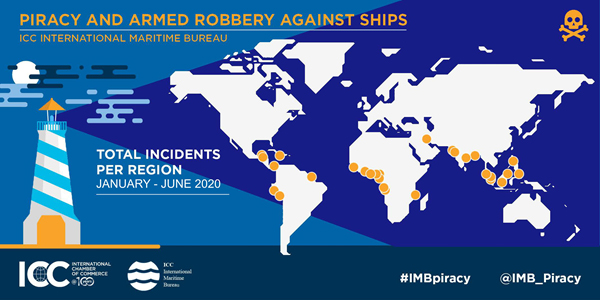IMB: Violent Attacks and Kidnappings Against Seafarers on the Rise
Violent attacks against ships and their crews rose by 20 percent in the first half of 2020 according to a mid-year update from the ICC International Maritime Bureau. While the report reviews incidents in the Singapore Straits, Indonesia, Latin and South America, the Gulf of Guinea off West Africa is cited as being the most dangerous for commercial shipping with an increasing number and more brazen attacks further out to sea.
In total, IMB’s Piracy Reporting Centre (PRC) recorded 98 incidents of piracy and armed robbery in the first half of 2020, up from 78 in the first half of 2019. A total of 77 seafarers have been taken hostage or kidnapped for ransom since January with the Gulf of Guinea accounting for over 90 percent of the maritime kidnappings worldwide.
“Violence against crews is a growing risk in a workforce already under immense pressure,” says IMB Director Michael Howlett. “In the Gulf of Guinea attackers armed with knives and guns now target crews on every type of vessel. Everyone’s vulnerable.”
Detailing the different types of piracy and armed robbery against ships in the first half of 2020, the report says vessels were boarded a total of 81 times. Also, there were 10 attempted attacks and six instances during which a vessel was fired upon. The one positive note the report cites is only a single hijacking, putting these attacks at their lowest level since 1993.
The attackers were indiscriminate in the types of vessels they are attacking. The report cited 36 attacks against tankers while 21 were against bulk carriers and 17 incidents against container ships. The remaining 24 attacks were on a variety of different types of ships. In most cases, the vessels were at anchor when attacked, but vessels underway are also being attacked in many parts of the world. However, it is less common for a vessel to be attacked while berthed.
In addition to being kidnapped, the crew was taken hostage in 23 instances while in other cases they were threatened, assaulted, or injured. The IMB says that these attacks are further adding to hardships faced by seafarers many of whom have been working beyond their contract periods unable to return home due to the travel restrictions resulting from the global public health emergency.

Geographically, the IMB reports that 49 crew members have been kidnapped for ransom in the Gulf of Guinea, being held for up to six weeks. Further, the number of kidnappings is increasing in the region with 32 crew kidnapped in the past three months. The assaults are also happening further out to sea. Two-thirds of the attacks were between 20 and 130 nautical miles from the coastline in the Gulf of Guinea.
The Singapore Straits also saw 11 incidents in the first half of 2020. However, most of the assaults in this region are cited as opportunistic, low-level attacks that are aborted once an alarm is sounded. Attacks in Indonesian anchorages and waterways however have also doubled in 2020. They have increased from 5 last year to 10 so far this year.
In South America, the IMB cites attacks in the Callao, Peru anchorage, while vessels off Ecuador have also recorded incidents each year since 2017 with at least three container ships attacked while underway this year.
The IMB is also recording more incidents in new areas of Latin America but says many attacks go unreported. The report cites four attacks in Mexico all targeting offshore vessels and happened within an 11-day period in April. One anchored accommodation barge was boarded by six people wearing face masks and armed with automatic weapons and pistols. They attempted to enter and opened fire, injuring a crew member and damaging three windows. Despite raising the alarm and a naval boat being dispatched the attackers reportedly escaped with high-value project equipment.
The report highlights the importance of promptly reporting any incidents. The IMB PRC will work in coordination with local agencies and vessel operators and that a quick response can deter piracy and armed robbery, improving security for seafarers.

that matters most
Get the latest maritime news delivered to your inbox daily.
“We need to change the risk-to-reward ratio for pirates operating within the Gulf of Guinea. Without an appropriate and proportionate deterrent, pirates and robbers will get more ruthless and more ambitious, increasing the risk to seafarers,” says Howlett.
In one recent case, the IMB reports the prompt response by the Nigerian Navy saved the crew on a fishing vessel boarded and hijacked by armed assailants in Ivory Coast waters. In another incident, a product tanker was attacked while underway around 127 miles off Bayelsa, Nigeria. Eight armed pirates kidnapped ten crew as well as stealing cash, personal valuables, and ship’s property. IMB PRC contacted regional and international authorities, and a Nigerian Navy Security Vessel was dispatched. A nearby vessel helped the four remaining crew members to sail the tanker to a safe port while the kidnapped crew were released three weeks later.
